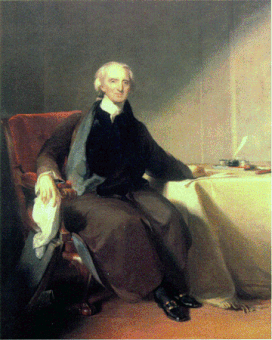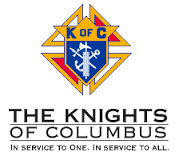
Charles Carroll of Carrollton
Carroll, Charles, called Charles Carroll of Carrollton (1737-1832), American patriot. Charles Carroll of Carrollton did not make his political debut as an elected official, but rather as “First Citizen,” in a newspaper debate with Daniel Dulaney, “Antilon,” on the subject of the Fee Bill of 1773. British law allowed government officials to charge fees for their services to the colonists. Dulany, an attorney and Loyalist, defended the fees. Carroll opposed them – a daring step for a Catholic. This was one of a series of “firsts” for Carroll: the first Roman Catholic to hold public office in Maryland for nearly a century, a member of the first Maryland Senate, and one of Maryland’s first two United States Senators.
The only son of Charles Carroll of Annapolis, Charles Carroll of Carrollton stood heir to a vast fortune which enabled him an extraordinary education. Carroll was sent abroad for his education, first attending the French colleges of St. Omer’s and Louis-le-Grand where he received a civil law degree, and then the Middle Temple in London where he was a student of English common law. Upon his return to America in 1764, his father presented him with the large estate known subsequently as Carrollton Manor.
In 1774, Carroll served in the Maryland Convention and on the Committee of Correspondence. He was a member of the Council of Safety in 1775, and a member of the committee which drafted the Maryland Constitution in 1776. Because of his legal disabilities as a Catholic, Carroll was not a delegate to the First Continental Congress, but did go to Philadelphia as an unofficial observer and advisor. In March of 1776, Carroll accompanied Samuel Chase and Benjamin Franklin on their unsuccessful mission to Canada. He was chosen for this venture, as John Adams later reflected, not only for his French fluency, but also because “he continues to hazard his all, his immense Fortune . . . and his life.”
During the June 1776 session of the Maryland Convention. Carroll introduced the resolution which finally rescinded the instructions restricting the congressional delegates. On July 4, Carroll was selected as an official delegate to the Continental Congress. He signed the Declaration of Independence on August 2, “most willingly” manifesting his long-held intention “to defend the liberties of my country, or die with them . . .”
He resigned from the Continental Congress in 1778 to serve in the Maryland state Senate. He was one of the first U.S. senators from Maryland, serving from 1789 to 1792. After twenty-three years in the Maryland Senate, in 1800, Carroll retired from public life, and spent the last three decades of his life as a businessman and entrepreneur. When John Adams and Thomas Jefferson died in 1826, Charles Carroll of Carrollton. Maryland’s “First Citizen,” became America’s last surviving Signer of the Declaration of Independence.
Adapted from a handout of the Commodore John Barry Assembly and “Carroll, Charles,” Microsoft(R) Encarta(R) 97 Encyclopedia. (c) 1993-1996 Microsoft Corporation. All rights reserved.
Carroll, Charles, called Charles Carroll of Carrollton (1737-1832), American patriot. Charles Carroll of Carrollton did not make his political debut as an elected official, but rather as “First Citizen,” in a newspaper debate with Daniel Dulaney, “Antilon,” on the subject of the Fee Bill of 1773. British law allowed government officials to charge fees for their services to the colonists. Dulany, an attorney and Loyalist, defended the fees. Carroll opposed them – a daring step for a Catholic. This was one of a series of “firsts” for Carroll: the first Roman Catholic to hold public office in Maryland for nearly a century, a member of the first Maryland Senate, and one of Maryland’s first two United States Senators.
The only son of Charles Carroll of Annapolis, Charles Carroll of Carrollton stood heir to a vast fortune which enabled him an extraordinary education. Carroll was sent abroad for his education, first attending the French colleges of St. Omer’s and Louis-le-Grand where he received a civil law degree, and then the Middle Temple in London where he was a student of English common law. Upon his return to America in 1764, his father presented him with the large estate known subsequently as Carrollton Manor.
In 1774, Carroll served in the Maryland Convention and on the Committee of Correspondence. He was a member of the Council of Safety in 1775, and a member of the committee which drafted the Maryland Constitution in 1776. Because of his legal disabilities as a Catholic, Carroll was not a delegate to the First Continental Congress, but did go to Philadelphia as an unofficial observer and advisor. In March of 1776, Carroll accompanied Samuel Chase and Benjamin Franklin on their unsuccessful mission to Canada. He was chosen for this venture, as John Adams later reflected, not only for his French fluency, but also because “he continues to hazard his all, his immense Fortune . . . and his life.”
During the June 1776 session of the Maryland Convention. Carroll introduced the resolution which finally rescinded the instructions restricting the congressional delegates. On July 4, Carroll was selected as an official delegate to the Continental Congress. He signed the Declaration of Independence on August 2, “most willingly” manifesting his long-held intention “to defend the liberties of my country, or die with them . . .”
He resigned from the Continental Congress in 1778 to serve in the Maryland state Senate. He was one of the first U.S. senators from Maryland, serving from 1789 to 1792. After twenty-three years in the Maryland Senate, in 1800, Carroll retired from public life, and spent the last three decades of his life as a businessman and entrepreneur. When John Adams and Thomas Jefferson died in 1826, Charles Carroll of Carrollton. Maryland’s “First Citizen,” became America’s last surviving Signer of the Declaration of Independence.
Adapted from a handout of the Commodore John Barry Assembly and “Carroll, Charles,” Microsoft(R) Encarta(R) 97 Encyclopedia. (c) 1993-1996 Microsoft Corporation. All rights reserved.

